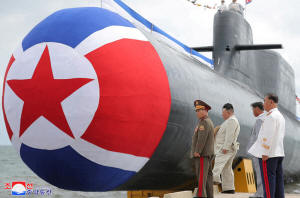North Korea wants to restart nuclear talks if Trump wins, says
ex-diplomat
 Send a link to a friend
Send a link to a friend
 [August 01, 2024]
By Hyonhee Shin [August 01, 2024]
By Hyonhee Shin
SEOUL (Reuters) - North Korea wants to reopen nuclear talks with the
United States if Donald Trump is re-elected as president and is working
to devise a new negotiating strategy, a senior North Korean diplomat who
recently defected to South Korea told Reuters.
The escape of Ri Il Gyu from Cuba made headlines globally last month. He
was the highest-ranking North Korean diplomat to defect to the South
since 2016.
In his first interview with international media, Ri said North Korea has
set Russia, the U.S. and Japan as its top foreign policy priorities for
this year and beyond.
While bolstering relations with Russia, Pyongyang was keen to reopen
nuclear negotiations if Trump - who engaged in both fiery brinkmanship
and unprecedented diplomacy with North Korea during his previous term -
won re-election in November, Ri said.
Pyongyang's diplomats were mapping out a strategy for that scenario,
with the goal of lifting of sanctions on its weapons programs, removing
its designation as a state sponsor of terrorism and eliciting economic
aid, said Ri.
His comments signal a potential about-face from the North's current
stance after recent statements ditching the possibility of dialogue with
the U.S. and warning of armed confrontation.

A summit between North Korean leader Kim Jong Un and Trump in Vietnam in
2019 collapsed over sanctions, for which Ri partly blamed Kim's decision
to entrust "inexperienced, clueless" military commanders with nuclear
diplomacy.
"Kim Jong Un doesn't know much about international relations and
diplomacy, or how to make strategic judgment," he said.
"This time, the foreign ministry would definitely gain power and take
charge, and it won't be so easy for Trump to tie North Korea's hands and
feet again for four years without giving anything."
RUSSIAN TIES, JAPAN AID
By forging closer ties with Russia, North Korea received help with its
missile technology and economy. But a bigger benefit could be to block
additional sanctions and undercut existing ones, Ri said, adding it
would raise Pyongyang's bargaining power against Washington.
"The Russians got their own hands dirty by engaging in illicit
transactions and, thanks to that, North Korea no longer needs to rely on
the U.S. to lift sanctions, which essentially means they stripped the
U.S. of one key bargaining chip," he said.
In Tokyo, Japanese Prime Minister Fumio Kishida has said he wants to
meet Kim, but the issue of Japanese nationals abducted by North Korea in
the 1970s and 80s has long been a stumbling block.
According to Ri, Kim would seek to hold a summit with Japan, aiming to
get economic assistance in return for concessions on the abductee issue.

[to top of second column]
|

North Korean leader Kim Jong Un attends what state media report was
a launching ceremony for a new tactical nuclear attack submarine in
North Korea, in this picture released by North Korea's Korean
Central News Agency (KCNA) on September 8, 2023. KCNA via REUTERS

Tokyo believes 17 of its citizens were abducted, five of whom
returned to Japan in 2002. Pyongyang sees the issue as settled,
having admitted to kidnapping 13 Japanese nationals and saying those
unaccounted for had either died or their whereabouts were unknown.
Ri said Kim would be willing to change that position, established
under his father Kim Jong Il, in order to obtain economic support.
"They're saying that the issue was resolved, but that's just to
boost negotiating power until he makes concessions at a summit," he
said.
RESENTMENT AND DEFECTION
Having studied at a French school in Algeria and lived in Cuba
alongside his late father, who was a state media reporter, Ri says
he had imagined a life in South Korea since his childhood, but never
acted to flee until he was bullied by a diplomatic colleague for
refusing his demand for bribes.
Then the defining moment came when Pyongyang instantly refused his
request to get medical treatment in Mexico, at his own expense, for
a ruptured disc in his neck.
"That exploded all the resentment I had been harboring towards the
regime," he said.
The COVID-19 lockdown deepened hardships at home and for those
stationed overseas, with most telephone lines to Pyongyang cut to
prevent any information from spreading in the outside world, Ri
said.
Financial troubles have also forced North Korea to shut down a dozen
of its 54 diplomatic missions.
"When they began reopening and summoning those working abroad in
early 2023, they asked to bring everything from used toothbrushes to
spoons back home, saying there's nothing there," he said.
Ri had also witnessed - and in his job tried to impede - the launch
of diplomatic relations between South Korea and Cuba, a Cold War-era
ally of North Korea.

"I had done everything to block that from happening, but
establishing relations with Cuba was the best thing South Korea had
done since last year," he said. "It was a model example of how the
tides of history have turned, and where a normal civilisation of the
international community is headed."
(Reporting by Hyonhee Shin; Editing by Alex Richardson)
[© 2024 Thomson Reuters. All rights
reserved.]This material
may not be published, broadcast, rewritten or redistributed.
Thompson Reuters is solely responsible for this content. |